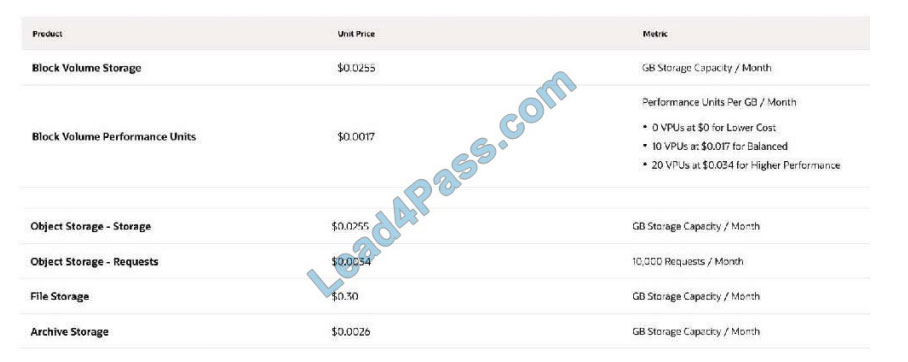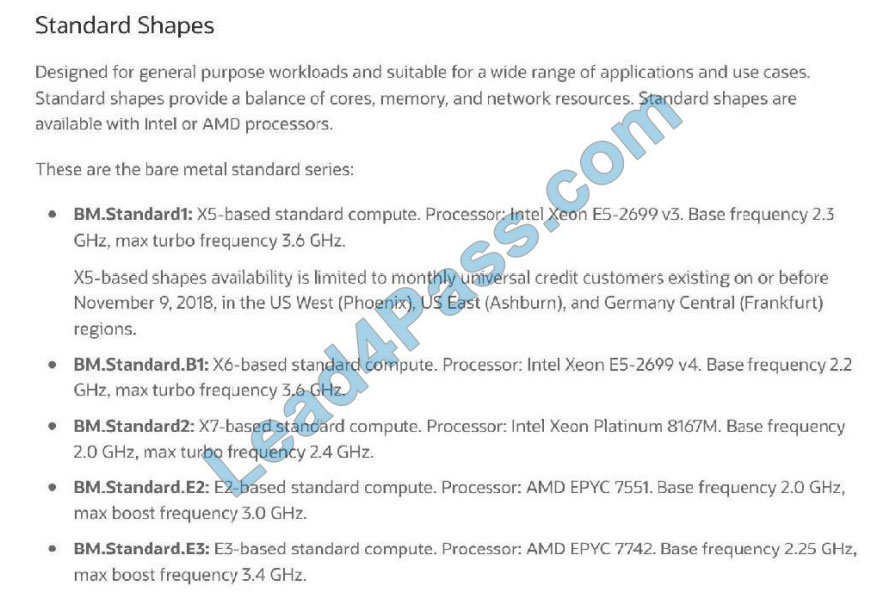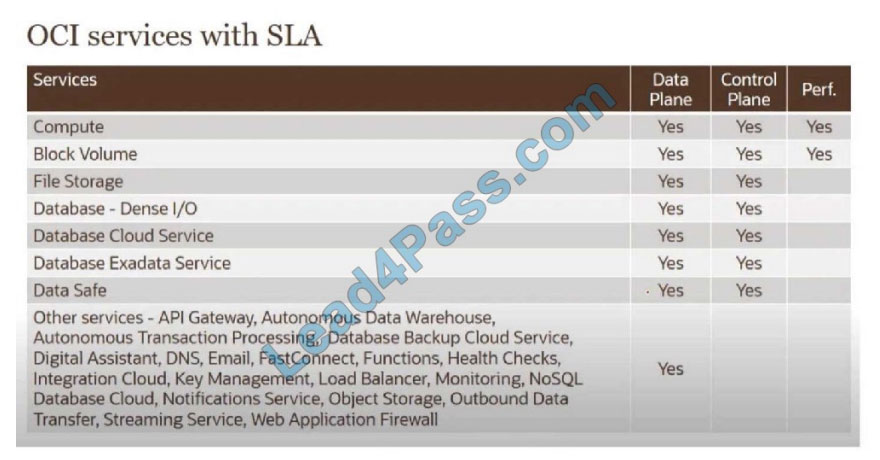The latest Oracle 1z0-1085-20 dumps by leads4pass helps you pass the 1z0-1085-20 exam for the first time! leads4pass
Latest Update Oracle 1z0-1085-20 VCE Dump and 1z0-1085-20 PDF Dumps, leads4pass 1z0-1085-20 Exam Questions Updated, Answers corrected!
Get the latest leads4pass 1z0-1085-20 dumps with Vce and PDF: https://www.leads4pass.com/1z0-1085-20.html (Q&As: 99 dumps)
[Free 1z0-1085-20 PDF] Latest Oracle 1z0-1085-20 Dumps PDF collected by leads4pass Google Drive:
https://drive.google.com/file/d/16eFL0HSNT652Fz3Gr_S1k1xgI23xZ9I-/
[leads4pass 1z0-1085-20 Youtube] Oracle 1z0-1085-20 Dumps can be viewed on Youtube shared by leads4pass
Latest Oracle 1z0-1085-20 Exam Practice Questions and Answers
QUESTION 1
Which CANNOT be used with My Oracle Support (MOS)?
A. Add or change a tenancy administrator
B. Request a Service Limit increase
C. Reset the password or unlock the account for the tenancy administrator
D. Troubleshoot your resources in an Oracle Cloud Infrastructure Free Trial account
Correct Answer: D
Open a support service request with the MOS option is available to paid accounts. Customers using only Always Free
resources are not eligible for Oracle Support. Limited support is available to Free Tier accounts with Free Trial credits.
After
you use all of your credits or after your trial period ends (whichever comes first), you must upgrade to a paid account to
access Oracle Support. If you choose not to upgrade and continue to use Always Free Services, you will not be eligible
to
raise a service request in My Oracle Support.
In addition to supporting technical issues, use My Oracle Support if you need to:
1.
Reset the password or unlock the account for the tenancy administrator
2.
Add or change a tenancy administrator
3.
Request a service limit increase
Reference: https://docs.cloud.oracle.com/en-us/iaas/Content/GSG/Tasks/contactingsupport.htm
QUESTION 2
You have an application that requires a shared file system. Which of the following services would you use?
A. File Storage
B. Archive Storage
C. Object Storage
D. Block Volume
Correct Answer: A
Oracle Cloud Infrastructure File Storage service provides a durable, scalable, secure, enterprise-grade network file
system. You can connect to a File Storage service file system from any bare metal, virtual machine, or container
instance in your Virtual Cloud Network (VCN). You can also access a file system from outside the VCN using Oracle
Cloud Infrastructure FastConnect and Internet Protocol security (IPSec) virtual private network (VPN). Large Compute
clusters of thousands of instances can use the File Storage service for high-performance shared storage. Storage
provisioning is fully managed and automatic as your use scales from a single byte to exabytes without upfront
provisioning. The File Storage service supports the Network File System version 3.0 (NFSv3) protocol. The service
supports the Network Lock Manager (NLM) protocol for file locking functionality. Oracle Cloud Infrastructure File Storage
employs 5-way replicated storage, located in different fault domains, to provide redundancy for resilient data protection.
Data is protected with erasure encoding. The File Storage service uses the “eventual overwrite” method of data
eradication. Files are created in the file system with a unique encryption key. When you delete a single file, its
associated encryption key is eradicated, making the file inaccessible. When you delete an entire file system, the file
system is marked as inaccessible. The service systematically traverses deleted files and file systems, frees all the used
space, and eradicates all residual files. Use the File Storage service when your application or workload includes big
data and analytics, media processing, or content management, and you require Portable Operating System Interface
(POSIX)-compliant file system access semantics and concurrently accessible storage. The File Storage service is
designed to meet the needs of applications and users that need an enterprise file system across a wide range of use
cases, including the following:
Reference: https://docs.cloud.oracle.com/en-us/iaas/Content/File/Concepts/filestorageoverview.htm
QUESTION 3
Which Oracle Cloud Infrastructure service can you use to assess the user security of your Oracle databases?
A. Oracle Data Safe
B. Oracle Data Guard
C. Audit Vault and Database Firewall option for Oracle Database Enterprise Edition
D. Audit Service
Correct Answer: A
Oracle Data Safe is a unified control center for your Oracle databases which helps you understand the sensitivity of your
data, evaluate risks to data, mask sensitive data, implement and monitor security controls, assess user security,
monitor
user activity, and address data security compliance requirements.
Whether you\\’re using an Autonomous Database or an Oracle DB system, Oracle Data Safe delivers essential data
security capabilities as a service on Oracle Cloud Infrastructure.
Reference:
https://docs.cloud.oracle.com/en-us/iaas/data-safe/doc/oracle-data-safe-overview.html
QUESTION 4
A customer wants a dedicated connection with minimal network latency from their on-premises data center to Oracle
Cloud Infrastructure (OCI). Which service should they choose?
A. Public internet
B. Virtual Cloud Network Remote Peering
C. OCI FastConnact
D. IPSec Virtual Private Network (VPN)
Correct Answer: C
Oracle Cloud Infrastructure FastConnect provides an easy way to create a dedicated, private connection between your
data center and Oracle Cloud Infrastructure. FastConnect provides higher-bandwidth options, and a more reliable and
consistent networking experience compared to internet-based connections

QUESTION 5
Which two security capabilities are offered by Oracle Cloud Infrastructure?
A. Always-on data encryption for data-at-rest.
B. Certificate Management service
C. Captcha
D. Key Management service
E. Managed Active Directory service
Correct Answer: AD
Oracle Cloud Infrastructure\\’s security approach is based on seven core pillars. Each pillar has multiple solutions
designed to maximize the security and compliance of the platform and to help customers to improve their security
posture. High Availability: Offer fault-independent data centers that enable high-availability scale-out architectures and
are resilient against network attacks, ensuring constant uptime in the face of disaster and security attacks. Customer
Isolation: Allow customers to deploy their application and data assets in an environment that commits full isolation from
other tenants and Oracle\\’s staff. Data Encryption: Protect customer data-at-rest and in-transit in a way that allows
customers to meet their security and compliance requirements with respect to cryptographic algorithms and key
management. Security Controls: Offer customers effectively and easy-to-use application, platform, and network security
solutions that allow them to protect their workloads, have a secure application delivery using a global edge network,
constrain access to their services, and segregate operational responsibilities to reduce the risk associated with
malicious and accidental user actions. Visibility: Offer customers comprehensive log data and security analytics that
they can use to audit and monitor actions on their resources, allowing them to meet their audit requirements and reduce
security and operational risk. Secure Hybrid Cloud: Enable customers to use their existing security assets, such as user
accounts and policies, as well as third-party security solutions when accessing their cloud resources and securing their
data and application assets in the cloud. Verifiably Secure Infrastructure: Follow rigorous processes and use effective
security controls in all phases of cloud service development and operation. Demonstrate adherence to Oracle\\’s strict
security standards through third-party audits, certifications, and attestations. Help customers demonstrate compliance
readiness to internal security and compliance teams, their customers, auditors, and regulators. Reference:
https://docs.cloud.oracle.com/en-us/iaas/Content/Security/Concepts/security_overview.htm
QUESTION 6
Which pricing model is NOT supported by Oracle Cloud Infrastructure?
A. Reserved Infrastructure
B. Universal Credits – Monthly Flex
C. Bring your own license
D. Pay-as-you-go
Correct Answer: A
The available purchase models are:
Pay As You Go (PAYG):
Billed in arrears based on consumption. Recommended for organizations who are trying new services, rapid
prototyping, or for elastic scaling.
Monthly Flex:
Billed in advance with a 12-month minimum. Use monthly or forfeit that month\\’s credits.
Recommended for customers with predictable production workloads or large long-running applications, such as HR,
payroll, analytics, and more.
Monthly Flex maximizes cost reduction with predictable monthly spending, similar to your monthly phone plan. Delivers
faster time to market by offering customers the choice of using any IaaS and PaaS services.
Oracle\\’s current PaaS offering is “license-included PaaS.” It includes:
1.
Compute and compute support
2.
Automation
3.
License entitlement and license support
Bring your own license
BYOL stands for “bring your own license.” Previously, you could bring your own licenses to Oracle IaaS, but to get the
benefits of PaaS automation, you couldn\\’t leverage existing licenses. This has been changed. We\\’re offering Oracle
BYOL
to PaaS, enabling our customers to leverage their investment in existing on-premises licenses in their journey to the
cloud.
Oracle BYOL to PaaS includes:
1.
Compute and compute support
2.
Automation
3.
Customers bring their on-premises license entitlement and get license support via their existing on-premises support
contract.
4.
As customers leverage their existing on-premises license entitlement, they can move to the cloud at a lower cost.
Reference: https://www.oracle.com/in/cloud/bring-your-own-license/faq/universal-credit-pricing.html OCI doesn\\’t offer
Reserved instances. Enterprise users and technology vendors alike require cost predictability to plan their budgets and run their business. The cost of running applications, databases, and large workloads in the cloud can be extremely
difficult to forecast leading to unforeseen expenses. Not with Oracle Cloud. Oracle has simple rate structures that
eliminate the cost surprises associated with hard-to-estimate usage elements like data egress and storage performance.
Oracle also charges the same rates for all regions, so going global on Oracle Cloud means no hidden cost variances.
Thus, Oracle\\’s cloud will provide you with industry-leading price-performance and tremendous business value.
Reference: https://www.oracle.com/in/cloud/pricing.html
QUESTION 7
What does Oracle\\’s Payment Card Industry Data Security Standard (PCI DSS) attestation of compliance provide to
customers?
A. Customers can use these services for workloads that provide validation of cardholder transaction but only as 3rd
party
B. Customers can use these services for workloads that process, or transmit cardholder data but not store it.
C. Customers can use these services for workloads to process applications for credit card approval securely.
D. Customers can use these services for workloads that store, process, or transmit cardholder data.
Correct Answer: D
The Payment Card Industry Data Security Standard (PCI DSS) is a global set of security standard designed to
encourage and enhance cardholder data security and promote the adoption of consistent data security measures
around the
technical and operational components related to cardholder data.
Oracle has successfully completed a Payment Card Industry Data Security Standard (PCI DSS) audit and received an
Attestation of Compliance (AoC) covering several Oracle Cloud Infrastructure services and the Oracle RightNow
Service Cloud Service. As a PCI Level 1 Service Provider, customers can now use these services for workloads that store,
process or transmit cardholder data.
Reference:
https://www.oracle.com/cloud/cloud-infrastructure-compliance/
QUESTION 8
Which is NOT covered by Oracle Cloud Infrastructure (OCI) Service Level Agreement (SLA)?
A. Manageability
B. Performance
C. Reliability
D. Availability
Correct Answer: C
https://www.oracle.com/assets/paas-iaas-pub-cld-srvs-pillar-4021422.pdf Enterprises demand more than just availability
from their cloud infrastructure. Mission-critical workloads also require consistent performance, and the ability to manage,
monitor, and modify resources running in the cloud at any time. Only Oracle offers end-to-end SLAs covering
performance, availability, manageability of services.
Reference: https://www.oracle.com/in/cloud/iaas/sla.html
QUESTION 9
Which offers the lowest pricing for storage (per GB)?
A. Oracle Cloud Infrastructure Object Storage (standard tier)
B. Oracle Cloud Infrastructure Block Volume
C. Oracle Cloud Infrastructure Archive Storage
D. Oracle Cloud Infrastructure File Storage
Correct Answer: C
Oracle Cloud Infrastructure Archive Storage is the lowest pricing for storage (per GB) Reference:
https://www.oracle.com/cloud/storage/pricing.html
Archive storage as seen above is the cheapest! Reference: https://www.oracle.com/cloud/storage/pricing.html
QUESTION 10
Which capability can be used to protect against unexpected hardware or power supply failures within an availability
domain?
A. Fault Domains
B. Compartments
C. Top of Rack Switches
D. Power Distribution Units
Correct Answer: A
A fault domain is a grouping of hardware and infrastructure within an availability domain. Each availability domain
contains three fault domains. Fault domains provide anti-affinity: they let you distribute your instances so that the
instances are
not on the same physical hardware within a single availability domain. A hardware failure or Compute hardware
maintenance event that affects one fault domain does not affect instances in other fault domains. In addition, the
physical
hardware in a fault domain has independent and redundant power supplies, which prevents a failure in the power supply
hardware within one fault domain from affecting other fault domains.
Usually, fault domains to do the following things:
1) Protect against unexpected hardware failures or power supply failures.
2) Protect against planned outages because of Compute hardware maintenance.
Reference: https://docs.cloud.oracle.com/en-us/iaas/Content/General/Concepts/regions.htm
QUESTION 11
Which two Oracle Cloud Infrastructure resources can be used to group/categorize expenses?
A. Policies
B. Tags
C. Users
D. Compartments
E. Groups
Correct Answer: BD
You can do Costs Analysis in OCI and you can group and filter the cost by Tags or compartments To filter costs by
dates To filter costs by tags To filter costs by compartments To remove a compartment or tag filter
QUESTION 12
Which Oracle Cloud Infrastructure compute shapes does not incur instance billing in a STOPPED state?
A. Dense I/O
B. Standard
C. GPU
D. HPC
Correct Answer: B
A shape is a template that determines the number of CPUs, amount of memory, and other resources that are allocated
to an instance. Standard shapes don\\’t incur costs in a STOPPED state.
QUESTION 13
Which SLA type is not offered by Oracle Cloud Infrastructure compute service?
A. Data Plane
B. Performance Plane
C. Service Plane
D. Control Plane
Correct Answer: C
Service Plane is NOT an SLA provided by OCI. See the table below:
Reference: https://k21academy.com/1z0-1085/service-level-agreement-sla-in-oracle-cloud-oci/
latest updated Oracle 1z0-1085-20 exam questions from the leads4pass 1z0-1085-20 dumps! 100% pass the 1z0-1085-20 exam!
Download leads4pass 1z0-1085-20 VCE and PDF dumps: https://www.leads4pass.com/1z0-1085-20.html (Q&As: 99 dumps)
Get free Oracle 1z0-1085-20 dumps PDF online: https://drive.google.com/file/d/16eFL0HSNT652Fz3Gr_S1k1xgI23xZ9I-/